
 |
|
May (2003) Cast: Angela Bettis, Jeremy Sisto, Anna Faris, James Duval, Nichole Hiltz, Chandler Hecht, Merle Kennedy, Kevin Gage, Will Estes, Rachel David, Roxanne Day, Jennifer Grant, Jesse Hlubik, Nora Zehetner 2003 – 93 minutes Rated: Reviewed by Dustin Putman, July 11, 2003.  It has been over two years since I have written a review for a motion picture currently available on video and DVD. I mostly prefer to stick to critiquing movies currently in theaters, and very few others invigorate enough passion in me to feel the need to write about them. Something, however, must be said about debuting writer-director Lucky McKee's "May," which is finishing up its very limited theatrical release and will be released to DVD on July 15. "May" was a critical hit when it premiered at the 2002 Sundance Film Festival and continued its acclaim via other fests and Internet word-of-mouth, but distributor Lionsgate Films treated it like an ugly stepchild and gave it zero support. Shame on you, Lionsgate! "May" is not only one of the most auspicious and original independent features in years—particularly for a first-time filmmaker—but it is one of the best films of 2003.
It has been over two years since I have written a review for a motion picture currently available on video and DVD. I mostly prefer to stick to critiquing movies currently in theaters, and very few others invigorate enough passion in me to feel the need to write about them. Something, however, must be said about debuting writer-director Lucky McKee's "May," which is finishing up its very limited theatrical release and will be released to DVD on July 15. "May" was a critical hit when it premiered at the 2002 Sundance Film Festival and continued its acclaim via other fests and Internet word-of-mouth, but distributor Lionsgate Films treated it like an ugly stepchild and gave it zero support. Shame on you, Lionsgate! "May" is not only one of the most auspicious and original independent features in years—particularly for a first-time filmmaker—but it is one of the best films of 2003.
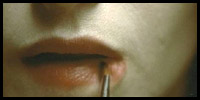 "May" is an incisive and touching character study about a young woman (Angela Bettis) whose childhood insecurities have carried over into adulthood. It is an often enormously funny comedy, in which the humor stems from both natural and offbeat human behavior and emotions. And then, finally, it takes a turn toward the grimmest recesses of the mind in the third act, when May's best friend—a sacred, eternally encased porcelain doll—is accidentally broken, and psychotic tendencies eventually alienate her from her only two living friends, the darkly sexy Adam (Jeremy Sisto) and wildly sensual co-worker Polly (Anna Faris). In a desperate attempt to rekindle the relationship she shared with her doll, May sets out to steal her favorite body parts from acquaintances and assemble a new life-size companion.
"May" is an incisive and touching character study about a young woman (Angela Bettis) whose childhood insecurities have carried over into adulthood. It is an often enormously funny comedy, in which the humor stems from both natural and offbeat human behavior and emotions. And then, finally, it takes a turn toward the grimmest recesses of the mind in the third act, when May's best friend—a sacred, eternally encased porcelain doll—is accidentally broken, and psychotic tendencies eventually alienate her from her only two living friends, the darkly sexy Adam (Jeremy Sisto) and wildly sensual co-worker Polly (Anna Faris). In a desperate attempt to rekindle the relationship she shared with her doll, May sets out to steal her favorite body parts from acquaintances and assemble a new life-size companion.
 "May" is a horror film, and it is one of the most inventive and genuinely disturbing ones to come around in some time, at that, but it offers up another characteristic more rare for the genre. Through Lucky McKee's impassioned direction and alternately delicate and merciless writing, he gets the viewer to put a rooting interest into the story and characters, and then gets them to care. It is safe to say that May eventually careens over the deep end into madness, but through the careful set-up of her character, one understands why she does what she does in the third act, even if they can't necessarily relate to it. In May's eyes, the murder of imperfect human beings is only a means in which to make a perfect doll out of each person's best physical features. May is a sick individual, but she is almost as much of a victim as she is the villain. The viewer fears what she may do next, even as they empathize with her lonely plight.
"May" is a horror film, and it is one of the most inventive and genuinely disturbing ones to come around in some time, at that, but it offers up another characteristic more rare for the genre. Through Lucky McKee's impassioned direction and alternately delicate and merciless writing, he gets the viewer to put a rooting interest into the story and characters, and then gets them to care. It is safe to say that May eventually careens over the deep end into madness, but through the careful set-up of her character, one understands why she does what she does in the third act, even if they can't necessarily relate to it. In May's eyes, the murder of imperfect human beings is only a means in which to make a perfect doll out of each person's best physical features. May is a sick individual, but she is almost as much of a victim as she is the villain. The viewer fears what she may do next, even as they empathize with her lonely plight.
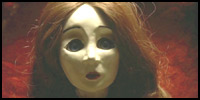 Perhaps what writer-director Lucky McKee achieves most beautifully is his three-dimensional presentation of May within a film that offers almost no horror scenes in the first hour, yet still has the viewer recoiling in apprehension at every encounter May has with someone, simply out of fear of what she may be capable of doing. At one point, May goes to work with a group of blind children at a day care center, but it remains unclear if she has offered her services as a way of doing genuine good, or out of more devious reasons.
Perhaps what writer-director Lucky McKee achieves most beautifully is his three-dimensional presentation of May within a film that offers almost no horror scenes in the first hour, yet still has the viewer recoiling in apprehension at every encounter May has with someone, simply out of fear of what she may be capable of doing. At one point, May goes to work with a group of blind children at a day care center, but it remains unclear if she has offered her services as a way of doing genuine good, or out of more devious reasons.
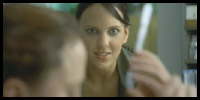 May is also deeply attracted to Adam, especially his hands, and she carries around a pack of cigarettes he once gave her as some sort of treasured entity. "Do you think I'm weird?" May asks Adam. "I like weird," horror movie buff Adam responds, but he follows that up later with, "not that weird," when she tries to reenact a scene from his latest student film, about cannibalism. Likewise, Polly is a free-spirited lesbian who shows a definite romantic interest in May, but unintentionally hurts her feelings when she later makes it clear that she doesn't practice monogamy.
May is also deeply attracted to Adam, especially his hands, and she carries around a pack of cigarettes he once gave her as some sort of treasured entity. "Do you think I'm weird?" May asks Adam. "I like weird," horror movie buff Adam responds, but he follows that up later with, "not that weird," when she tries to reenact a scene from his latest student film, about cannibalism. Likewise, Polly is a free-spirited lesbian who shows a definite romantic interest in May, but unintentionally hurts her feelings when she later makes it clear that she doesn't practice monogamy.
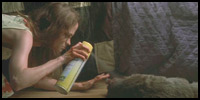 In a talent-defining role that will hopefully do for her what 1976's "Carrie" did for Sissy Spacey, Angela Bettis (1999's "Girl, Interrupted") is note-perfect as the mousy and dangerous May. Bettis has made the wise decision to play up May's crumbling self-esteem and yearnings to fit in rather than her villainy, which causes the proceedings to be all the more heartbreaking when she is driven mad. Meanwhile, May's doll, which she confides in and thinks of as a miniature version of herself, looms over the scenes even when it isn't present, the cracking of the glass it is encased in a chilling symbol of May's own fracturing sanity.
In a talent-defining role that will hopefully do for her what 1976's "Carrie" did for Sissy Spacey, Angela Bettis (1999's "Girl, Interrupted") is note-perfect as the mousy and dangerous May. Bettis has made the wise decision to play up May's crumbling self-esteem and yearnings to fit in rather than her villainy, which causes the proceedings to be all the more heartbreaking when she is driven mad. Meanwhile, May's doll, which she confides in and thinks of as a miniature version of herself, looms over the scenes even when it isn't present, the cracking of the glass it is encased in a chilling symbol of May's own fracturing sanity.
 In key supporting roles, Jeremy Sisto (2003's "Wrong Turn") effectively chooses to play Adam with an attractive swagger he doesn't recognize and a relatively normal personality that spars with May's more adventurous and pushy side, while Anna Faris (2002's "The Hot Chick") is a delight as the almost-as-offbeat Polly who, nonetheless, refuses to be faithful to May. Faris plays her last scene, especially, with a frightening vulnerability, its cumulative effect proving unshakable.
In key supporting roles, Jeremy Sisto (2003's "Wrong Turn") effectively chooses to play Adam with an attractive swagger he doesn't recognize and a relatively normal personality that spars with May's more adventurous and pushy side, while Anna Faris (2002's "The Hot Chick") is a delight as the almost-as-offbeat Polly who, nonetheless, refuses to be faithful to May. Faris plays her last scene, especially, with a frightening vulnerability, its cumulative effect proving unshakable.
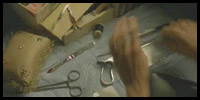 The climax of "May" is nearly unbearable in its assured intensity and unforgettable in its unblinking views of psychological sickness, ruthless serial murder, and even darker possible areas of the human condition. The first full hour of exposition and set-up brilliantly paves the way for what finally occurs, even if you cannot quite believe director McKee's bravely grim and poignant intentions. The final image "May" cooks up is its most courageous. In the wrong hands, or in a more exploitative movie that had not allowed its audience to care about its main character, the shot may have inspired bad laughs. It does not, however, and McKee earns its subtle implications. Simply put, it is the most bone-chilling sequence of the year, infinitely more disturbing than anything in "House of 1000 Corpses," "Wrong Turn," "Identity," or "28 Days Later."
The climax of "May" is nearly unbearable in its assured intensity and unforgettable in its unblinking views of psychological sickness, ruthless serial murder, and even darker possible areas of the human condition. The first full hour of exposition and set-up brilliantly paves the way for what finally occurs, even if you cannot quite believe director McKee's bravely grim and poignant intentions. The final image "May" cooks up is its most courageous. In the wrong hands, or in a more exploitative movie that had not allowed its audience to care about its main character, the shot may have inspired bad laughs. It does not, however, and McKee earns its subtle implications. Simply put, it is the most bone-chilling sequence of the year, infinitely more disturbing than anything in "House of 1000 Corpses," "Wrong Turn," "Identity," or "28 Days Later."
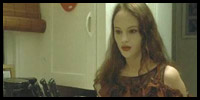 Lion's Gate may have ruined its chances of gaining a large following through theatrical bookings, but "May" has what it takes to become a cult phenomenon, much like 2001's initially overlooked but finally found "Donnie Darko." As a stirring drama, a marvelously developed character piece, a sly black comedy, a taut psychological thriller, and a gory, scary, no-holds-barred horror film, "May" is a new cinematic masterwork, a film with the ability to do all five things at once, or apart, with pitch-perfect grace. Don't let this one-of-a-kind experience pass you by.
Lion's Gate may have ruined its chances of gaining a large following through theatrical bookings, but "May" has what it takes to become a cult phenomenon, much like 2001's initially overlooked but finally found "Donnie Darko." As a stirring drama, a marvelously developed character piece, a sly black comedy, a taut psychological thriller, and a gory, scary, no-holds-barred horror film, "May" is a new cinematic masterwork, a film with the ability to do all five things at once, or apart, with pitch-perfect grace. Don't let this one-of-a-kind experience pass you by.
|
© 2003 by Dustin Putman |














